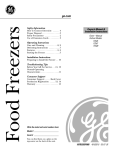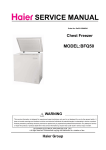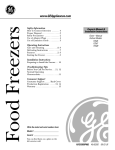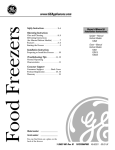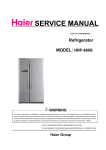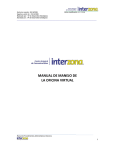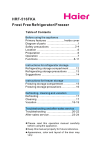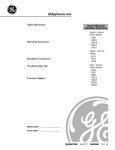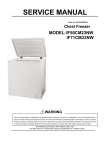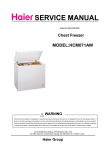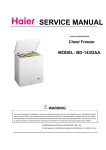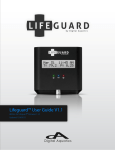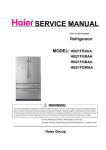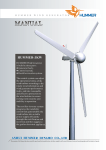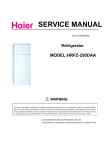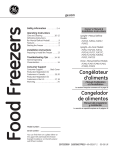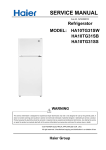Download SERVICE MANUAL
Transcript
SERVICE MANUAL Chest Freezer MODEL: FCM7SUHWW FCM7DUHWW WARNING This service information is designed for experienced repair technicians only and is not designed for use by the general public. It dose not contain warnings and cautions to advice non-technical individuals of potential dangers in attempting to service a product. Product powered by electricity should by serviced or repaired only by experienced professional technicians. Any attempt to service or repair the product or products dealt with in this service information by anyone else could result in serious injury or death. 2013(HAIER ELECTRICAL APPLIANCES COR. LTD) ©All right reserved. Unauthorized copying and distribution is a violation of law. SERVICE MANUAL Model: FCM7SUHWW/FCM7DUHWW Issue 2013-09-26 REV Ref1309S003V0 Contents Chapter 1 General Information .......................................................................................................... 3 1-1. General Guidelines ................................................................................................................. 3 1-2. Insurance Test ........................................................................................................................ 3 1-3. How to read this Service Manual ............................................................................................ 4 Chapter 2 Product Feature ................................................................................................................. 5 2-1. SPECIFICATIONS .................................................................................................................. 5 2-2. External views ........................................................................................................................ 7 Chapter 3 Installation, adjustments and maintenance .................................................................... 8 3-1. Installation .............................................................................................................................. 8 3-2 Defrosting and Draining ........................................................................................................... 8 3-3 Cleaning the Freezer ............................................................................................................... 9 Chapter 4 Disassembly .................................................................................................................... 10 4-1. Door assembly (Door, hinge, hinge cover) ........................................................................... 10 4-2. Compartment Grill assembly ................................................................................................ 10 4-3. Control panel assembly (Panel, cover board, knob, indicator light) ...................................... 11 4-4. Thermostat assembly ........................................................................................................... 11 Chapter 5 Control and display system ........................................................................................... 12 5-1. Control panel ........................................................................................................................ 12 5-2. Starting the Freezer .............................................................................................................. 12 Chapter 6 System flow principle ..................................................................................................... 13 6-1. Refrigeration flow chart......................................................................................................... 13 6-2. Refrigeration flow scenograph .............................................................................................. 14 Chapter 7 Circuit diagram ................................................................................................................ 15 7-1. Brief principle diagram .......................................................................................................... 15 Chapter 8 Trouble shooting ............................................................................................................. 16 8-1. Normal phenomena .............................................................................................................. 16 8-2. Abnormal phenomena .......................................................................................................... 18 2 SERVICE MANUAL Model: FCM7SUHWW/FCM7DUHWW Issue 2013-09-26 REV Ref1309S003V0 Chapter 1 General Information 1-1. General Guidelines When servicing, observe the original lead dress. If a short circuit is found, replace all parts which have been overheated or damaged by the short circuit. After servicing, see to it that all the protective devices such as insulation barriers, insulation papers shields are properly installed. After servicing, make the following leakage current checks to prevent the customer from being exposed to shock hazards. 1) Leakage Current Cold Check 2) Leakage Current Hot Check 3) Prevention of Electro Static Discharge (ESD) to Electrostatic Sensitive 1-2. Insurance Test 1. Check if there is any leak of current. 2. Cut out the power supply before the repair to avoid an electrical shock hazard. 3. In the case of a live-line test, insulating gloves should be worn to avoid potential electrical shock. 4. Confirm the rated current, voltage and capacity before testing with any kinds of instruments. 5. Watch if the upper door is open when you check something at a lower position. 6. Take out every part in the cabinet before moving the machine, especially things like panels (e.g. glass shelf). 7. Please wear intact cotton gloves when repair any parts of the evaporator, so that scratches by the sharp fins can be avoided. 8. If there is a breakdown with the refrigeration system, please surrender the machine to the service center, else the leaked refrigerant may pollute the atmosphere. 9. The refrigerator use AC of 115V with a frequency of 60Hz. 10. A big fluctuation of voltage may cause a start failure of the refrigerator, a burn-out of the control panel and compressor, or an abnormal sound from the compressor in operation. 11. Take care not to damage the supply line. Don’t yank at the line; pull the plug out gently from the receptacle. Don’t press the line under the cabinet or step on it. Take care not to roll on or damage the 3 SERVICE MANUAL Model: FCM7SUHWW/FCM7DUHWW Issue 2013-09-26 REV Ref1309S003V0 supply line when moves the machine from the wall. 12. In the case of leakage of inflammable gases like carbon monoxide, open the door and windows. Don’t pull out or insert the plugs of the appliance. 13. Don’t touch the refrigeration surface of the freezing compartment when the refrigerator is in operation, especially when your hand is wet, else you may be glued to the surface. 14. Pull out the plug of power supply during clearance or power outage. Wait at least five minutes to resume the power supply in order to prevent damage to the compressor caused by continuous restart. Photo used in this manual The illustration and photos used in this Manual may not base on the final design of products, which may differ from your products in some way. 1-3. How to read this Service Manual Icons are used to attract the attention of the reader to specific information. The meaning of each icon is described in the table below: Note: A “note” provides information that is not indispensable, but may nevertheless be valuable to the reader, such as tips and tricks. Caution: A “caution” is used when there is danger that the reader, through incorrect manipulation, may damage equipment, loose data, get an unexpected result or has to restart (part of) a procedure. Warning: A “warning” is used when there is danger of personal injury. Reference: A “reference” guides the reader to other places in this binder or in this manual, where he/she will find additional information on a specific topic. 4 SERVICE MANUAL Issue 2013-09-26 REV Ref1309S003V0 Model: FCM7SUHWW/FCM7DUHWW Chapter 2 Product Feature 5 2-1. SPECIFICATIONS 1 FCM7SUHWW FCM7DUHWW GE GE Chest Freezer Chest Freezer 7 7 Manual Defrost Yes Yes Adjustable Temperature Control Yes Yes R134a R134a Foaming components C-P C-P Wrap-Around Condenser Yes Yes Wrap-Around Evaporator Yes Yes Defrost Water Drain Yes Yes Power "On" Light Yes Yes Lock no yes Slide out Storage Baskets 2 2 Wire Wire Second Level Rail n/a n/a Divider no yes Yes Yes Textured Aluminum Textured Aluminum White White Rec Rec Height (in.) A 33 1/4 33 1/4 Width (in.) C 37 37 Model Photo Commercial brand Product description 2 Capacity Total Volume (cu. ft.) 3 Features Kind of coolant Slide out Storage Baskets Material 4 Economical/Quiet Insulation (cabinet foam, lid packed) Cabinet Liner 5 Appearance Color Available Handle 6 Weights & Dimensions SERVICE MANUAL Issue 2013-09-26 REV Ref1309S003V0 Model: FCM7SUHWW/FCM7DUHWW Depth (in.) D 21-5/8 21-5/8 Product Weight (lbs.) 84 84 Air Clearances Each Side (in.) 3 3 Air Clearances Back (in.) 3 3 Approximate Shipping Weight(lbs) 90 90 Kraft Kraft 115V/60Hz 115V/60Hz Amps 1.7A 1.7A Max Energy Usage (kwh/yr) 277 277 GB/FR GB/FR Carton Graphics 7 Energy Voltage/Frequency 8 Service User instruction 6 SERVICE MANUAL Issue 2013-09-26 REV Ref1309S003V0 Model: FCM7SUHWW/FCM7DUHWW 2-2. External views 7 Door Cabinet Control panel Drain pipe SERVICE MANUAL Model: FCM7SUHWW/FCM7DUHWW Issue 2013-09-26 REV Ref1309S003V0 Chapter 3 Installation, adjustments and maintenance 3-1. Installation The freezer should be conveniently located for day-to-day use in a dry well-ventilated room. Do not install the freezer where the temperature will go below 0°F or above 110°F, because it will not maintain proper temperatures. Be sure to install the freezer on a floor strong enough to support it when it is fully loaded. The freezer must be solidly positioned on the floor if it is to function at its best. Shims may be used to accomplish this wherever the floor is too uneven. If the place selected for the freezer is damp or moist, place 2 X 4 s (51 mm X 102 mm) under its entire length to assure adequate support. If the freezer has been inclined more then 45° position, we need wait 24 hours before restarting the freezer. 3-2 Defrosting and Draining In most climates, defrosting will be necessary only about twice a year. To have the freezer operate most efficiently, do not permit more than 1/2” (13 mm) of frost to accumulate on the shelves. To remove frost, scrape with a plastic or wood spatula or scraper. Do not use an ice pick or sharp-edged instrument as it may damage or scratch the freezer. Do not use any electrical device in defrosting the freezer. For Complete Defrosting 1. Turn the temperature control to the OFF position and unplug the freezer. 2. Remove all food and place it in corrugated boxes, insulated bags, picnic coolers, etc. Use towels and newspapers for insulation as needed. 3. With the door/lid open, use pans of hot water to speed loosening of frost. Remove large pieces before they melt. Chest models have a defrost water drain at the front. 8 SERVICE MANUAL Model: FCM7SUHWW/FCM7DUHWW Issue 2013-09-26 REV Ref1309S003V0 4. Sponge excess water from the bottom of the freezer as it collects to prevent over flowing. 5. After defrosting, clean the inside of the freezer. 6. Replace the drain plug inside the cabinet and the cap on the defrost drain. Fold over and dry the gasket on the hinge side of the lid. 7. Plug in the freezer. Return the temperature control to its previous position and return food to the freezer. Water may drip from the back flange of the lid cover during defrosting. This is normal. Ice builds up in the lid insulation when the lid is open for adding or removing food, and melts during the defrosting operation. 3-3 Cleaning the Freezer Outside. Protect the paint finish. The finish on the outside of the freezer is a high quality baked-on paint finish. With proper care, it will stay new-looking and rust-free for years. Apply a coat of appliance polish wax when the freezer is new and then at least twice a year. Appliance polish wax also works well to remove tape residue from freezer surfaces. Keep the finish clean. Wipe with a clean cloth lightly dampened with appliance polish wax or mild liquid dishwashing detergent. Dry and polish with a clean, soft cloth. Do not wipe the freezer with a soiled dishwashing cloth or wet towel. Do not use scouring pads, powdered cleaners, bleach, or cleaners containing bleach. Inside. Clean the inside of the freezer at least once a year. We recommend that the freezer be unplugged before cleaning. If this is not practical, wring excess moisture out of sponge or cloth when cleaning in the vicinity of switches, lights or controls. Use warm water and baking soda solution-about a tablespoon of baking soda to a quart of water. Rinse thoroughly with water and wipe dry. Do not use cleaning powders or other abrasive cleaners. An open box of baking soda in the freezer will absorb stale freezer odors. Change the box ever y three months. Care should be taken in moving the freezer away from the wall. All types of floor coverings can be damaged particularly cushioned coverings and those with embossed surfaces. 9 SERVICE MANUAL Model: FCM7SUHWW/FCM7DUHWW Issue 2013-09-26 REV Ref1309S003V0 Chapter 4 Disassembly 4-1. Door assembly (Door, hinge, hinge cover) Unscrew the hinge cover screw with screwdriver, take away the top and bottom cover by pull it, and then unscrew the screws on the hinge, so the whole hinge could be moved. Top hinge cover Bottom hinge cover 4-2. Compartment Grill assembly Unscrew the two screw of grill; we can take away the grill. 10 SERVICE MANUAL Model: FCM7SUHWW/FCM7DUHWW Issue 2013-09-26 REV Ref1309S003V0 4-3. Control panel assembly (Panel, cover board, knob, indicator light) 11 Unscrew the compartment grill (refer 4-2), push the panel claw gently with our finger or tools, at the same time pull panel outside then take away it. Take away the knob with a sharp-edged tool. Press the cover board and take it away. Press two claws on indicator light side and push it from back to front. 4-4. Thermostat assembly First take off the knob (refer 4-3), Use turnbuckle spanner or acutilingual plier unscrew the turnbuckle, and then thermostat can be moved from back of panel. Note: When assembly thermostat we should placed thermostat in originally direction. SERVICE MANUAL Issue 2013-09-26 REV Ref1309S003V0 Model: FCM7SUHWW/FCM7DUHWW Chapter 5 Control and display system 12 5-1. Control panel Freezing temperature selection is made by setting the control from 1 to 7 (coldest). If we want colder or warmer temperatures, adjust the control one step at a time. Allow several hours after each one-step adjustment for the freezer temperature to stabilize. . 3 2 4 1 5 6 OFF 7 Turning the control to the OFF position stops the cooling process but does not shut off power to the freezer. 5-2. Starting the Freezer 1. Clean the inside of the freezer with a mild solution of baking soda and water 2. Connect cord to power outlet. 3. On models with a Temperature Monitor or High-Temp Alarm Switch, set the switch to the OFF position. 4. Make sure the temperature control is set at 4. 5. Allow freezer to operate for at least four hours before placing food inside. 6. On models with a Temperature Monitor or High-Temp Alarm Switch, set the switch to the ON position. SER RVICE MANU M UAL Model: FCM7SUH HWW/FCM7 7DUHWW Isssue 2013-0 09-26 R REV Ref13009S003V0 Chaptter 6 Syystem flow f principle 6-1. Refrigeratio on flow ch hart The refrig geration syystem of direct d coolin ng single-sy ystem cooller belongss to the category c of a single-tem mperature an nd single-co ontrol refrige erating syste em with one evaporatorrs which is controlled c byy a single tem mperature co ontrol. 13 SERVICE MANUAL Model: FCM7SUHWW/FCM7DUHWW Issue 2013-09-26 REV Ref1309S003V0 6-2. Refrigeration flow scenograph 14 SERVICE MANUAL Model: FCM7SUHWW/FCM7DUHWW Chapter 7 Circuit diagram 7-1. Brief principle diagram Issue 2013-09-26 REV Ref1309S003V0 15 SERVICE MANUAL Issue 2013-09-26 REV Ref1309S003V0 Model: FCM7SUHWW/FCM7DUHWW Chapter 8 Trouble shooting 16 8-1. Normal phenomena Problem Freezer does not operate or Power-On Light is not on Freezer starts/stops too frequently Freezer operates too long Possible Causes What To Do Temperature control in OFF or Min or 0 position. Move the control to a temperature setting. Freezer is unplugged. Push the plug completely into the outlet. The fuse is blown/circuit breaker is tripped. Replace fuse or reset the breaker Door/lid left open. Check to see if package is holding door/lid open. Too frequent or too long to door/lid openings. Temperature control set too cold. See About the operation of your freezer Door/lid left open. Check to see if package is holding door/lid open. Too frequent or too long door/lid openings. Noisy operation or cabinet vibrates Freezer temperature too warm Temperature control set too cold. See Inadequate air circulation space around cabinet. See Preparing to install the freezer Fast Freeze switch is in the ON position (on some models) See About the operation of your freezer Floor may be weak, causing freezer to vibrate when compressor is on. Placing 2 X 4s (51 mm X 102 mm) under the length of the freezer will help support it and may reduce vibration. Cabinet is not positioned solidly on floor See Preparing to install the freezer Or use shims for uneven floor Door/lid left open. Check to see if package is holding door/lid open. Too frequent or too long door/lid openings. About the operation of your freezer SERVICE MANUAL Issue 2013-09-26 REV Ref1309S003V0 Model: FCM7SUHWW/FCM7DUHWW Foods defrosting Temperature control OFF or Min or 0 positions. Move the control to a temperature setting. Freezer is unplugged. Push the plug completely into the outlet. The fuse is blown/circuit breaker is tripped. Replace fuse or reset the breaker Door/lid left open. Check to see if package is holding door/lid open. Too frequent or too long door/lid openings. Freezer temperature too cold Temperature control set too cold. See About the operation of your freezer Fast Freeze switch is in the ON position or has run for too long (on some models) About the operation of your freezer Moisture forms on outside of cabinet Not unusual during periods of high humidity Wipe surface Interior light does No power at outlet. not work (on some models) Freezer is unplugged. Light bulb burned out. Door/lid wont fully close by itself Package holding door/lid open. Slow starting time after being off Built-in overload product. Excessive frost build-up Door/lid left open. Too frequent or too long door/lid openings. Not unusual during periods of high humidity Replace fuse or reset the breaker Push the plug completely into the outlet. Replace bulb. Check to see if package is holding door/lid open. 17 SERVICE MANUAL Issue 2013-09-26 REV Ref1309S003V0 Model: FCM7SUHWW/FCM7DUHWW 8-2. Abnormal phenomena 18 8-2-1. No cooling No cooling Whether the refrigerator can start NO Test according to the process of the refrigerator can not start YES Whether the temperature of fresh food compartment do not descend and after a little minute, it will stop running YES Exchange the thermostat NO Check whether the working current of compressor is higher than 120% of normal operating current YES If the noise of compressor is loud YES NO If compressor can run naturally and temperature raising of condenser is very low Check whether the working current of compressor is lower than 80% of normal operating current YES YES Cooling system or drier filter is blocked. To evacuate and pour the cooling system and recharge refrigerant again The working sound of compressor is small YES YES If the temperature raising and drier filter is very low of condenser NO Both high-pressure pipe and low-pressure pipe temperature are same as the ambient temperature YES Compressor defect and change it Refrigerant leak, check and repair charge refrigerant again. SERVICE MANUAL Model: FCM7SUHWW/FCM7DUHWW Issue 2013-09-26 REV Ref1309S003V0 8-2-2.Compressor no start 19 Compressor no working Check if the home power is conduct NO Connect the power YES Check if thermostat is set at “0” YES Adjust thermostat setting position NO Test if the thermostat is normal under power on status: Check if the thermostat is normal Method-1: Setting thermostat to coldest position (7 grade), observe if the machine can be started. If compressor still not start, it means that the thermostat maybe failure. YES Test if resistance of PTC starter, if it is ZERO or INFINITE, means the starter is out of Check if the PTC starter is normal? work. For PTC starter, when shake it, it should not have noise, if it has, means the starter Magnetic Disk burned. YES 1. Measure whether two ends of overload protector is through using multimeter Ohm grade. Not through means protector is Check if the overload protector is normal? defective. 2. Measure running current of compressor using clamp-type Compressor NOT NORMAL accessories tester. If overload protector act when current is normal, means failure protector failure and should be replaced. YES Check if each connector of PTC starter overload protector is in good condition? Check each connectors of the PTC starter and overload protector, ensure each contact is in good condition, then power on and retest the machine. NOT NORMAL Compressor accessories failure SERVICE MANUAL Model: FCM7SUHWW/FCM7DUHWW Issue 2013-09-26 REV Ref1309S003V0 YES Check if normal ? the compressor is Test the resistance parameter of the compressor; if it is ZERO, inner winding is short circuit. If it is infinite, inner winding is break circuit YES Check if the starting current of compressor excess too much? If all technical parameter of compressor and compressor accessories (PTC starter, overload protector, run capacitor) are normal after above test, but compressor still can not be started, and overload protector action, the actual starting current excess too much. This phenomenon usually caused by compressor inner mechanical failure (cylinder-block or axis-hung problem). 20 SERVICE MANUAL . Model: )&068+::)&0'8+:: Issue 2013-0-2 Rev. Ref13S00V0 8-2-3.Poor cooling 21 Insufficient cooling Check if the voltage of home power supply is normal NO Connect to power supply. NO Adjust temperature setting 21 YES If the thermostat grade or temperature setting is reasonable? YES If the frequency opening door is frequently, and the ambient temperature is too high? YES YES YES Whether user has put much food in the refrigerator? Decrease the frequency opening door Guide user note that: Don’t put too much food into the refrigerator once, and inner compartment should keep some gap so that the air flow. Hot food should be cooled prior to being stored. NO YES Whether the refrigerator near heat source, or there is cumulate goods around it ? Guide user note that: Don’t put refrigerator near hot source or sunshiny place. Other objects around it should be maintained 10-20cm distance so that the air flow. NO Check door sealing gasket, if exist gap between the door and cabinet? YES Adjust or replace door sealing gasket NO YES Temperature rise is very small although compressor running all along? Refrigerant leakage NO Whether the volume of evaporator frosting evenly normal NO Refrigerant leakage or cooling system blocked YES NO Whether the thermostat is normal? Adjust or replace thermostat YES Check if compressor accessories and compressor is normal? NO Change compressor compressor accessories or Test and repair cooling system, then recharge refrigerant SERVICE MANUAL Issue 2013-09-26 REV Ref1309S003V0 Model: FCM7SUHWW/FCM7DUHWW 8-2-4.Noisy 22 Noisy Whether has exterior influence factor? Adjust appliance and explain to user YES NO YES Whether the sound is normal? Explain to user NO Exterior factor and solution measure : 1. The adjustable foot is not level.--Explained the ground is uneven, user can use spanner adjust refrigerator food, locates the freezer in the horizontal position 2. The freezer and other goods bump or near to the wall--The user may move the goods which bumps or adjust the distance between freezer and wall (10-20cm) Noise type Cooling system noise Compressor noise Is there collision between compressor/pipe/compressor support bracket/drain pipes? Relay sound YES Adjust distance to more than Whether the compressor YES fixing clips or bolts are loose Adjust and fix bolts or fixing clip NO NO Rumble sound YES NO Whether the damper block of compressor is disabled or no flexibility? Wind blow sound Whether the pipeline does Replace rubber damper cushion Is the rumble sound big? NO YES YES YES NO Is the freezing evaporator is fixed tightly? YES NO Adjust and fix Refilling Whether terminal box is fixed tightly? YES Compressor-self noise Adjust pipeline, or add shock damper glue Refrigerant eruption YES The capillary tube is not smooth or Compressor starter noise YES Replace starter Add shock damper glue or fix the evaporator tightly.






















